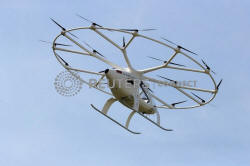Volocopter eyes launch of its electric helicopter taxis in Singapore
 Send a link to a friend
Send a link to a friend
 [September 30, 2019] By
John Geddie and Aradhana Aravindan [September 30, 2019] By
John Geddie and Aradhana Aravindan
SINGAPORE (Reuters) - German startup
Volocopter said Singapore is emerging as one of the most likely
destinations for the commercial launch of its electric helicopters,
where it hopes to offer short-hop flights for the price of a limousine
ride.
The co-founder of the company, which is working with Singapore
regulators to conduct a public test flight in coming months, said the
city-state, Dubai and Germany were the markets most open to its air
taxis.
A number of firms are trying to bring so-called air taxis to mass market
but a lack of regulation and infrastructure, and safety concerns have
proved barriers.
Volocopter, which counts Daimler, Intel and Geely [GEELY.UL] among its
backers, is targeting a planned commercial rollout in two to three years
of its drone-like taxis that resemble a small helicopter powered by 18
rotors.

"For the commercial routes, we have two customers profiles: one is a
business customer, so perhaps from the airport to the business centre,
or for tourists flying from Marina Bay to Sentosa," Alexander Zosel told
Reuters. Marina Bay is Singapore's business district and Sentosa is its
popular resort island.
Zosel said the startup is looking for more financial partners in a
funding round it plans to close in January 2020.
The firm has raised 85 million euros ($93 million) to date, the latest
in a 50 million euro tranche led by Chinese car maker Geely earlier this
year.
[to top of second column] |

A prototype of an electrical air taxi that takes off and lands
vertically (eVTOLs), made by German startup Volocopter, flies during
a demonstration round at the Daimler museum in Stuttgart, Germany,
September 14, 2019. REUTERS/Michael Dalder/File Photo

Daimler, Intel and Geely each own around 10% of the company, a Daimler
spokeswoman said.
Volocopter says it has clocked over 1,000 test flights: some piloted by humans
and others flown by remote control or autonomously on pre-determined routes.
Zosel said the first commercial flights will be piloted, leaving room for only
one passenger, but that in five to 10 years he hopes to transition to
fully-autonomous flying.
Singapore is one of the most advanced countries in the world in terms of its
testing of autonomous vehicles, and plans to deploy driverless buses in three
districts of the island from 2022.
Yet with strict rules for flying unmanned aircraft - especially after drones
caused a series of airport delays this year - and a lack of helipads, it remains
to be seen whether Volocopter can meet its lofty ambitions for the city-state.
(Reporting by John Geddie and Aradhana Aravindan; Editing by Muralikumar
Anantharaman)
[© 2019 Thomson Reuters. All rights
reserved.] Copyright 2019 Reuters. All rights reserved. This material may not be published,
broadcast, rewritten or redistributed.
Thompson Reuters is solely responsible for this content. |